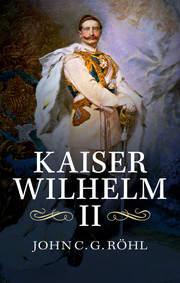Book contents
- Frontmatter
- Dedication
- Contents
- List of figures
- Acknowledgements
- Preface to the English edition
- Preface to the German edition
- Acknowledgements
- Overview: Wilhelm the Last, a German trauma
- Part I 1859–1888: The Tormented Prussian Prince
- Part II 1888–1909: The Anachronistic Autocrat
- Part III 1896–1908: The Egregious Expansionist
- Part IV 1906–1909: The Scandal-Ridden Sovereign
- Part V 1908–1914: The Bellicose Supreme War Lord
- Part VI 1914–1918: The Champion of God’s Germanic Cause
- 25 The Kaiser’s war aims
- 26 The impotence of the Supreme War Lord at war
- 27 Downfall: the collapse of the Hohenzollern monarchy
- Part VII 1918–1941: The Vengeful Exile
- Notes
- Index
25 - The Kaiser’s war aims
Published online by Cambridge University Press: 05 September 2014
- Frontmatter
- Dedication
- Contents
- List of figures
- Acknowledgements
- Preface to the English edition
- Preface to the German edition
- Acknowledgements
- Overview: Wilhelm the Last, a German trauma
- Part I 1859–1888: The Tormented Prussian Prince
- Part II 1888–1909: The Anachronistic Autocrat
- Part III 1896–1908: The Egregious Expansionist
- Part IV 1906–1909: The Scandal-Ridden Sovereign
- Part V 1908–1914: The Bellicose Supreme War Lord
- Part VI 1914–1918: The Champion of God’s Germanic Cause
- 25 The Kaiser’s war aims
- 26 The impotence of the Supreme War Lord at war
- 27 Downfall: the collapse of the Hohenzollern monarchy
- Part VII 1918–1941: The Vengeful Exile
- Notes
- Index
Summary
For Wilhelm II and his entourage the bloody conflict that broke out between the nations of Europe in August 1914 was, not least, also a worldwide struggle between the divine principle of monarchy and the diabolical notion of democracy. ‘If you do not want to see God’s hand in everythng, even in the most unbearable, you are lost,’ wrote the head of his Military Cabinet, General von Lyncker, in his diary after losing two of his sons. The Kaiser’s absolutist convictions came vividly to light in conversations he had with the American ambassador, James Gerard, in late 1915, after the war had been raging for eighteen months. As Colonel Edward House noted,
the Kaiser talked of peace and how it should be made and by whom, declaring that ‘I and my cousins, George and Nicholas, will make peace when the time comes’. Gerard says to hear him talk one would think that the German, English, and Russian peoples were so many pawns on a chessboard. He made it clear that mere democracies like France and the United States could never take part in such a conference. His whole attitude was that war was a royal sport, to be indulged in by hereditary monarchs and concluded at their will.
Not surprisingly, Colonel House wondered whether the Kaiser ‘was crazy or whether he was merely posing’. On another occasion Wilhelm announced that the ‘pointless bloodletting’ had to be ‘brought to an end through an agreement between the monarchs’, since ‘in the other countries a conscienceless lawyer class without any sense of responsibility to God is at the helm’. As late as in March 1918, when Ludendorff seemed to have achieved a breakthrough on the western front, the Kaiser exclaimed: ‘The battle is won, the English are utterly beaten [and] if an English officer comes with a flag of truce he will first have to kneel before the Kaiser’s standard, for this marks the victory of Monarchy over Democracy.’
- Type
- Chapter
- Information
- Kaiser Wilhelm IIA Concise Life, pp. 167 - 171Publisher: Cambridge University PressPrint publication year: 2014



